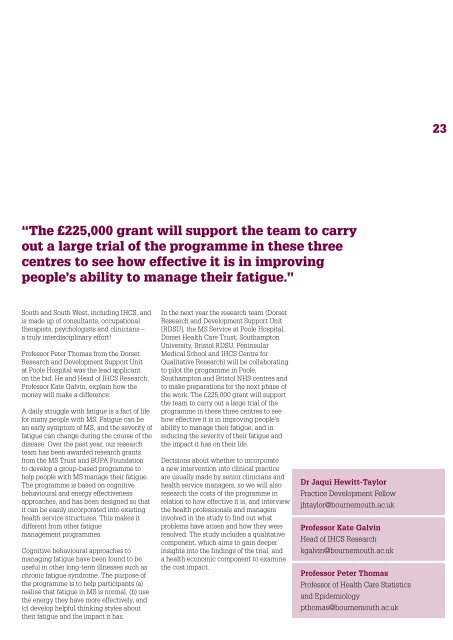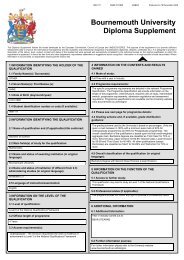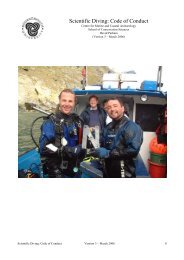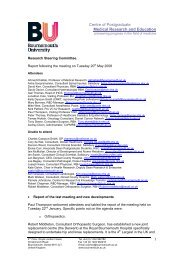Issue 9 (PDF 1.26 mb) - Bournemouth University
Issue 9 (PDF 1.26 mb) - Bournemouth University
Issue 9 (PDF 1.26 mb) - Bournemouth University
You also want an ePaper? Increase the reach of your titles
YUMPU automatically turns print PDFs into web optimized ePapers that Google loves.
“The £225,000 grant will support the team to carry<br />
out a large trial of the programme in these three<br />
centres to see how effective it is in improving<br />
people’s ability to manage their fatigue.”<br />
South and South West, including IHCS, and<br />
is made up of consultants, occupational<br />
therapists, psychologists and clinicians –<br />
a truly interdisciplinary effort!<br />
Professor Peter Thomas from the Dorset<br />
Research and Development Support Unit<br />
at Poole Hospital was the lead applicant<br />
on the bid. He and Head of IHCS Research,<br />
Professor Kate Galvin, explain how the<br />
money will make a difference:<br />
A daily struggle with fatigue is a fact of life<br />
for many people with MS. Fatigue can be<br />
an early symptom of MS, and the severity of<br />
fatigue can change during the course of the<br />
disease. Over the past year, our research<br />
team has been awarded research grants<br />
from the MS Trust and BUPA Foundation<br />
to develop a group-based programme to<br />
help people with MS manage their fatigue.<br />
The programme is based on cognitive<br />
behavioural and energy effectiveness<br />
approaches, and has been designed so that<br />
it can be easily incorporated into existing<br />
health service structures. This makes it<br />
different from other fatigue<br />
management programmes.<br />
Cognitive behavioural approaches to<br />
managing fatigue have been found to be<br />
useful in other long-term illnesses such as<br />
chronic fatigue syndrome. The purpose of<br />
the programme is to help participants (a)<br />
realise that fatigue in MS is normal, (b) use<br />
the energy they have more effectively, and<br />
(c) develop helpful thinking styles about<br />
their fatigue and the impact it has.<br />
In the next year the research team (Dorset<br />
Research and Development Support Unit<br />
[RDSU], the MS Service at Poole Hospital,<br />
Dorset Health Care Trust, Southampton<br />
<strong>University</strong>, Bristol RDSU, Peninsular<br />
Medical School and IHCS Centre for<br />
Qualitative Research) will be collaborating<br />
to pilot the programme in Poole,<br />
Southampton and Bristol NHS centres and<br />
to make preparations for the next phase of<br />
the work. The £225,000 grant will support<br />
the team to carry out a large trial of the<br />
programme in these three centres to see<br />
how effective it is in improving people’s<br />
ability to manage their fatigue, and in<br />
reducing the severity of their fatigue and<br />
the impact it has on their life.<br />
Decisions about whether to incorporate<br />
a new intervention into clinical practice<br />
are usually made by senior clinicians and<br />
health service managers, so we will also<br />
research the costs of the programme in<br />
relation to how effective it is, and interview<br />
the health professionals and managers<br />
involved in the study to find out what<br />
problems have arisen and how they were<br />
resolved. The study includes a qualitative<br />
component, which aims to gain deeper<br />
insights into the findings of the trial, and<br />
a health economic component to examine<br />
the cost impact.<br />
Dr Jaqui Hewitt-Taylor<br />
Practice Development Fellow<br />
jhtaylor@bournemouth.ac.uk<br />
Professor Kate Galvin<br />
Head of IHCS Research<br />
kgalvin@bournemouth.ac.uk<br />
Professor Peter Thomas<br />
Professor of Health Care Statistics<br />
and Epidemiology<br />
pthomas@bournemouth.ac.uk<br />
23










